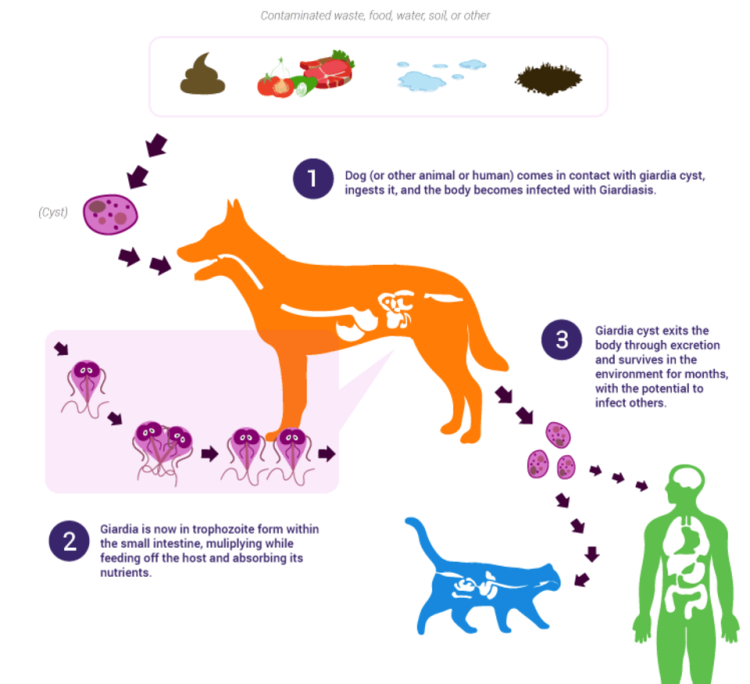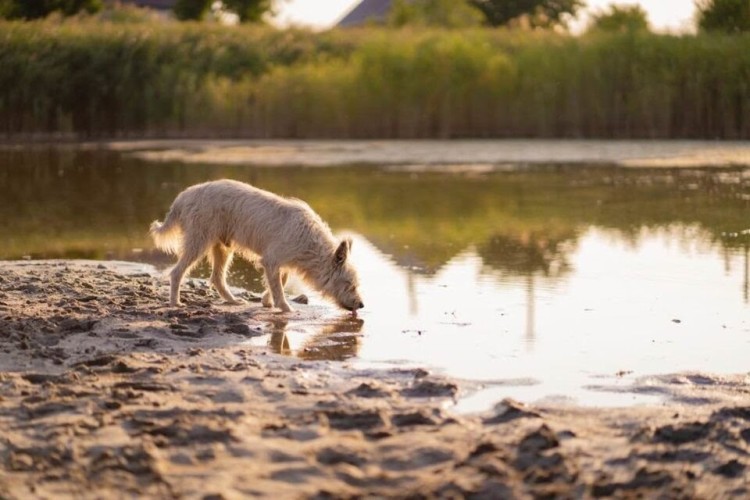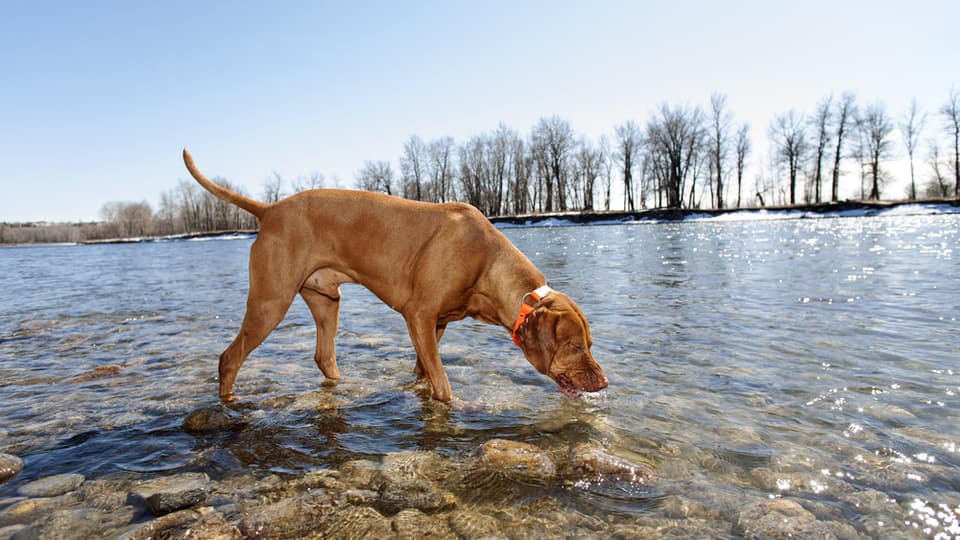Giardia is a common parasite that's easily transmissable between dogs, cats, and humans. It causes diarrhea and vomiting, among other symptoms, but fortunately, there are some steps pet parents can take to protect their pups from infection.
Here’s everything your need to know about the causes, symptoms, and treatment of Giardiasis in dogs to help keep your loved one safe.
Pro tip: Some pet insurance policies cover conditions like Giardia, kennel cough, and parvo as long as the condition is not pre-existing, all required or recommended vaccinations are current, and preventative measures have been taken.
Table of Contents:
- What is Giardia?
- How is Giardia spread?
- Who’s at risk of Giardia?
- Is Giardia dangerous in dogs?
- Symptoms of Giardia in dogs
- How is Giardia dagnosed in dogs?
- Treating Giardia in dogs
- How to clean the home if your dog has Giardia
- Preventing Giardia in dogs
- Key Takeaways
What is Giardia?
Giardia, also called Giardia duodenalis or Giardia intestinalis in veterinary terms, is a single-celled parasite that multiplies in the intestines of mammals, amphibians, and birds.
There are different forms of the Giardia parasite - cysts and trophozoites - but they both cause similar effects in dogs. Trophozoites are mature parasites that live in the small intestine where they eventually become cysts, which are shed into the infected animal’s feces. The cysts can survive for weeks or months in different environments, even in moist or cold conditions.
How is Giardia spread?
Dogs can become infected with Giardia upon ingestion of the parasite. They might eat something contaminated by feces (grass, sticks, etc.) or drink contaminated water (puddles). Dogs can be notoriously good at chewing on all sorts of objects, so the risk of Giardia infection is fairly high.
Giardia infection in dogs could also be spread by pups who play and roll around in contaminated soil, or by licking their body after contact with a contaminated surface (dog crate, litter box, etc.).
Once Giardia enters the dog's intestines, the parasite can be spread onward - even if your pet shows no symptoms of infection. This can be quite problematic, especially for those with multiple pets in the home. Cross-species transmissions are rare, but the parasite is easily transmissable from one dog to another. Therefore, if one of your dogs is diagnosed with Giardia, consult your veterinarian about the precautions you must take in order to protect your other pups.
Whos is at risk of Giardia?
All breeds are at risk of Giardia, but older dogs and puppies are at increased risk due to their weak or compromised immune systems. Giardiasis is also more common among animals confined in groups, such as boarding facilities or kennels.
Giardia is a zoonotic parasite, which means that it can be transmitted to humans, so you should always be careful when handling your pup's feces and wash your hands thoroughly thereafter. Also, refrain from drinking water from rivers, streams, and creeks with purifying it first. The parasite can be present in soil and on food, therefore it's wise to clean all produce before cooking.

Is Giardia in dangerous in dogs?
Pets with Giardiasis usually respond well to treatment and don’t suffer lasting consequences. However, Giardiasis is very dangerous for animals with compromised immunity, including younger and older dogs
Not all dogs experience symptoms of Giardia infection, but it can be very unpleasant for those that do. The Giardia parasite obstructs dogs' ability to properly absorb nutrients, electrolytes, and water, resulting in diarrhea. The diarrhea can be mild or explosive, and intermittent or continuous, but puppies typically get it the worst.
Failure to diagnose dog Giardia can delay treatment, leading to sudden weight loss, dehydration, and the development of more serious health concerns - in severe cases, even death.
Symptoms of Giardia in dogs
Some dogs are asymptomatic, while others might present the following Giardia symptoms:
- Vomiting
- Nausea
- Diarrhea
- Dehydration
- Weight loss
- Decreased appetite
- Failure to gain weight
- Abdominal discomfort
- Gas or bloating
- Soft and pale stool with mucus
- Foul-smelling stool
- Steatorrhea (stool that has an oily or greasy appearance)
- Lack of energy
- Poor coat appearance
If your beloved pet has a secondary infection or an immunosuppressive disease, the symptoms might be more intense. Be sure to talk to your veterinarian about an appropriate treatment plan as soon as possible.
How is Giardia diagnosed in dogs?
The diagnosis of Giardia can be tricky because the cysts are shed in the feces intermittently. The standard diagnostic procedures, like complete blood count, urinalysis, and serum biochemistry will likely show normal results. Any abnormality present might result from lack of electrolytes due to dehydration caused by diarrhea - not the parasite directly. Your vet may therefore recommend additional tests to rule out possible conditions associated with your dog's symptoms.
The tests that give an accurate diagnosis of Giardia infection include:
- Direct fluorescent antibody assay (DFA) and fecal ELISA - Both can confirm the presence of Giardia, but testing needs to be done three times over five consecutive days to increase the chance of detection to 90%.
- Fecal flotation - A test used to detect cysts in the stool.
- Direct smear - Requires a fresh stool sample to detect first-stage trophozoites with a 70% chance of success.
Your vet might recommend a combination of tests before a final diagnosis is made.
Pro Tip: If you notice any symptoms, the value of pet insurance shines during diagnostic coverage. Many plans provide reimbursement for the cost of testing, which is the only way to determine whether your dog has a Giardia infection or a larger health concern. Don’t attempt to check for cysts in your dog’s feces; they’re invisible to the human eye.
 (Image source: Hospital Veterinari Glories)
(Image source: Hospital Veterinari Glories)
Treating Giardia in dogs
Giardia infection is known to lead to digestive motility disorders and can induce inflammatory bowel disease, so all pets who contract the parasite should be treated by a vet.
Typically, the best treatment for Giardia is oral medicine, usually antiparasitic drugs and/or antibiotics that you can administer at home. The length of treatment depends on the drug chosen by the vet but typically lasts three to 10 days.
Your vet will also recommend bathing with a prescription shampoo on a regular basis to remove cysts and fecal matter from your dog’s fur and skin. Pay special attention to the hind legs, as this is where the cysts are most likely to be.
If your dog has severe dehydration caused by explosive diarrhea, they might be hospitalized to reduce the amount of stool movement before treatment starts. If your pet is vomiting persistently, stick to a bland diet once the vomiting is resolved.
With proper treatment, you can get rid of the parasite within two weeks. Be sure to follow your vet’s recommendations closely and take your dog to all follow-up appointments as requested.
How to clean the home if your dog has Giardia
All furniture, carpet, and toys that might have had contact with the infected animal must be cleaned to ensure there are no cysts lingering around the house.
First, scrub hard surfaces like floors, tables, crates, and trash cans with soap, then disinfect using bleach and water (3/4 cup of bleach per one gallon of water).
Clean upholstered furniture and carpet should be cleaned with regular detergent and disinfect by steam cleaning the area at 212°F for one minute (or 158°F for five minutes).
Other items like toys, pet beds, and clothing should be cleaned and sanitized on a daily basis the dog's treatment for Giardia infection. Dishwasher-safe food and water bowls can be cleaned in a dishwasher that has a dry cycle. If you don’t have a dishwasher, submerge these items in boiling water for at least one minute.
Clothing, bedding, and linens can be washed in the washing machine and then left to air dry thoroughly. If you have a clothes dryer, dry the clothes on the highest heat setting for half an hour.
If your pet is taking medication, wash linens frequently until a few days after the last dose of medication is given. Giardia’s survival depends on several factors, so it’s best to consult your vet for further advice.
Preventing Giardia in dogs
When it comes to Giardia prevention, a little effort can go a long way. Even though it’s not always possible to control every aspect of your pup’s environment, there are certain things you can do to prevent them from catching the disease.
The most important thing is to reduce the chances of your dog drinking from contaminated water by ensuring access to fresh and clean water at all times. Before you take your pup for a walk, make sure they’ve had plenty of water or consider bringing some along. If your water source is known to contain Giardia, consider boiling your pup’s water or buying a filter that’s proven to remove the parasitic cysts from the water.
Keep an eye on your furry pal while they’re out, making sure that they don’t eat anything off the ground. Avoid areas where there may be large amounts of dog feces in the environment and be careful to avoid leaving your pup at group facilities that do not thoroughly sanitize the grounds.
Finally, pay attention to general hygiene. Pick up after your pup whenever they go potty to practice good manners and prevent the spread of Giardia in environment.
All pups, even those without diarrhea and those on year-round parasite preventives, should have at least one or two fecal samples performed each year to screen for gastrointestinal parasites, including Giardia.
Final thoughts
If you’re concerned that your pup might have caught the parasite, get in touch with your veterinarian. They will help you determine if your pet needs to be examined and can provide more specific tips on how to prevent Giardia in your dog for future reference.
Key Takeaways
- Giardia is a parasite that attacks the intestines and causes diarrhea in humans and animals.
- Giardia spreads to dogs very easily through food, water, and soil contaminated by feces in the environment.
- A veterinarian may need to conduct tests to diagnose Giardia in dogs because the symptoms can be difficult to identify.
- Pet insurance can help cover the cost of testing and treatment, but be sure to thoroughly desanitize your home to reduce the risk of reinfection due to cysts living on contaminated surfaces.
